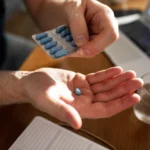Physical Symptoms and Somatic Complaints
Physical symptoms and somatic complaints are also prevalent in individuals with complex PTSD. These symptoms and additional symptoms often include:
- Chronic pain
- Gastrointestinal issues
- Headaches
- Muscle discomfort
The body’s prolonged stress response can contribute to these physical manifestations, making it essential to recognize and address them as part of the overall treatment plan.
Understanding the connection between psychological distress and physical symptoms is crucial for providing comprehensive care to those suffering from traumatic stress disorder PTSD and complex PTSD.
Chronic Pain
Chronic pain is a common physical manifestation of complex PTSD. Individuals may experience ongoing discomfort, such as headaches or muscle aches, often without a clear medical cause. This persistent pain is frequently linked to the body’s prolonged stress response, which can keep the muscles in a state of tension, contributing to prolonged or repeated trauma and long term trauma.
Recognizing chronic trauma as a symptom of complex PTSD is crucial for effective treatment and support, as it highlights the need for a holistic approach to managing both physical and psychological symptoms. Understanding the connection between trauma and chronic pain can help in developing targeted strategies to alleviate this discomfort.
Somatic Complaints
Somatic complaints are physical symptoms that arise without a clear medical explanation, often rooted in psychological distress. Individuals with complex PTSD frequently report symptoms such as:
- Stomach aches
- Headaches
- Muscle pain
These symptoms cannot be easily explained by medical evaluations. These complaints are a manifestation of the body’s response to trauma and stress, highlighting the need for addressing both the mental and physical aspects of the disorder.
Recognizing somatic complaints as part of the core symptoms of complex PTSD is essential for providing comprehensive care and support.
Sleep Problems
Sleep problems are prevalent among individuals with complex PTSD and can significantly impact overall health and well-being. Many people report difficulty falling asleep or staying asleep, often due to heightened anxiety and hypervigilance. These sleep disturbances can exacerbate other PTSD symptoms, creating a vicious cycle of poor sleep and increased stress.
Addressing sleep problems is crucial for managing symptoms and improving mental well-being, as quality sleep is essential for recovery and overall health.
Relationship Difficulties
Complex PTSD can significantly impact relationships, leading to various difficulties such as trust issues, fear of rejection, and challenges with emotional regulation. These relationship difficulties often stem from the trauma and can complicate one’s ability to form and maintain healthy connections.
Understanding how complex PTSD affects relationships is crucial for providing support and fostering healing.
Trust Issues
Trust issues are a common challenge for individuals with complex PTSD. These issues often arise from past experiences of betrayal or repeated abuse, which can make it difficult to trust others. The fear of abandonment can trigger clingy behavior in relationships, as individuals may worry constantly about being left alone or rejected.
This pervasive sense of mistrust can hinder the ability to form intimate connections, creating a barrier to meaningful relationships.
Fear of Rejection
Fear of rejection is another significant relational challenge for those with complex PTSD. Anxiety about abandonment often leads individuals to withdraw from social interactions, preferring isolation over the risk of being rejected. This anxiety can create a cycle where the fear of rejection exacerbates feelings of isolation, further entrenching the individual’s sense of loneliness and despair.
Addressing these fears is crucial for improving self-esteem and fostering healthier social interactions.
Emotional Regulation in Relationships
Emotional regulation is key to maintaining healthy relationships, but it can be particularly challenging for individuals with complex PTSD. Difficulty managing emotions can lead to misunderstandings and conflicts, creating ongoing tension between partners.
Practicing emotional regulation can help enhance communication and strengthen relationships, providing a foundation for mutual understanding and support. Addressing these challenges is essential for fostering a supportive relational environment that can aid in the healing process.
Impact on Self-Identity and Spirituality
Complex PTSD can profoundly affect an individual’s self-identity and spirituality. Feelings of despair and hopelessness regarding the future are common, and these emotions can lead to a disconnection from one’s spiritual beliefs and sense of purpose.
Understanding the impact of trauma and traumas on self-identity and spirituality is crucial for providing comprehensive care and fostering a sense of hope and belonging.
Loss of Identity
Loss of identity is a significant issue for many individuals with complex PTSD. The trauma can lead to a diminished sense of self, making individuals feel disconnected from their former identities. This detachment can result in a persistent struggle with self-perception and self-worth, complicating the recovery process.
Addressing this loss of identity is crucial for helping individuals rebuild their sense of self and fostering a positive self-view.
Spiritual Disconnection
Spiritual disconnection is another profound impact of complex PTSD. Complex trauma can cause individuals to question their spiritual beliefs, leading to a sense of conflict and disconnection from previously held faith or spiritual practices. This disconnection can be particularly distressing, as it intersects with their religious experiences and complicates their beliefs.
Addressing spiritual disconnection is essential for providing holistic care and helping individuals find a sense of peace and purpose.
Treatment Options for Complex PTSD
Various treatment options are available for complex PTSD, including therapy and medication management. The main treatment options include therapeutic approaches such as Cognitive Processing Therapy (CPT) and Eye Movement Desensitization and Reprocessing (EMDR), which have proven effective in helping individuals treat PTSD, process traumatic memories and manage symptoms.
Medication management can also play a crucial role in alleviating symptoms of anxiety and depression, providing a comprehensive approach to treatment.
Cognitive Processing Therapy
Cognitive Processing Therapy (CPT) is a structured 12-session therapeutic approach designed to modify negative thought patterns stemming from traumatic experiences. It helps individuals re-evaluate and alter distorted beliefs, providing a framework for understanding and processing their trauma through trauma focused cbt.
CPT is particularly effective in treating complex PTSD, as it addresses the cognitive distortions that contribute to feelings of unworthiness and hopelessness. CPT aims to transform negative thought patterns, fostering healthier cognitive processes and enhancing overall mental well-being.
Eye Movement Desensitization and Reprocessing (EMDR)
Eye Movement Desensitization and Reprocessing (EMDR) is another effective treatment for complex PTSD. This therapy uses guided eye movements to help individuals process and integrate traumatic memories, reducing the distress associated with those memories. Eye movement desensitisation is a key component of this therapeutic approach.
EMDR facilitates the processing of traumatic memories through bilateral stimulation, often involving guided eye movements, which helps to reprocess these memories in a less distressing way. This treatment can significantly alleviate symptoms of complex PTSD, providing relief from distressing memories and improving emotional regulation.
Medication Management
Medication management is often an essential component of treatment for complex PTSD. Medications that can help alleviate symptoms of anxiety and depression include:
- Antidepressants
- Anti-anxiety medications
- Mood stabilizers Mental health professionals play a crucial role in:
- Determining the appropriate medications and dosages
- Monitoring side effects to ensure the individual’s well-being.
Combining medication management with therapeutic approaches can provide a comprehensive treatment plan, addressing both the psychological and physiological aspects of complex PTSD.
When to Seek Help
Identifying the need for professional support is vital for managing complex PTSD effectively. Persistent hopelessness, overwhelming emotions, and severe symptoms strongly indicate the need to consult a mental health professional. The World Health Organization recognizes post traumatic stress disorder as a distinct condition, underscoring the importance of specialized treatment.
Knowing when to seek help can improve mental health outcomes and provide essential recovery support for those with mental health conditions.
Recognizing the Need for Professional Support
Identifying signs that indicate a need for professional support is crucial for managing complex PTSD. Persistent hopelessness or overwhelming emotions strongly indicate the need to seek help from a mental health professional. Consulting a professional can improve mental health outcomes, providing essential support and guidance for managing symptoms.
Acknowledging the need for help is the first step toward recovery and improved mental well-being.
Services at Atlantic Behavioral Health
Atlantic Behavioral Health provides various services to support individuals struggling with complex PTSD. These services include therapy and medication management, tailored to address the specific needs of each individual. The facility offers comprehensive care, combining Cognitive Behavioral Therapy (CBT), EMDR, and medication management for a holistic treatment plan.
Consulting mental health professionals at Atlantic Behavioral Health can provide essential support for managing symptoms and achieving recovery.
Recognizing the emotional, behavioral, cognitive, and physical symptoms of complex PTSD is essential for understanding and managing this challenging condition. Emotional dysregulation, chronic guilt or shame, and emotional numbness are key emotional symptoms, while behavioral symptoms include avoidance, hypervigilance, and exaggerated startle response. Cognitive symptoms such as intrusive thoughts, difficulty concentrating, and cognitive distortions further complicate the individual’s mental health. Physical symptoms and somatic complaints, such as chronic pain and sleep problems, highlight the need for a comprehensive treatment approach.
Relationship difficulties, loss of identity, and spiritual disconnection also play significant roles in the overall impact of complex PTSD. Treatment options, including Cognitive Processing Therapy, EMDR, and medication management, offer effective ways to manage symptoms and promote recovery. Recognizing the need for professional support and seeking help from facilities like Atlantic Behavioral Health can provide the necessary guidance and care for those suffering from complex PTSD.
Frequently Asked Questions
What are the main emotional symptoms of complex PTSD?
The primary emotional symptoms of complex PTSD are emotional dysregulation, chronic guilt or shame, and emotional numbness. These manifestations can greatly affect one’s emotional well-being and ability to manage feelings.
How does complex PTSD affect relationships?
Complex PTSD affects relationships by undermining trust, inducing fear of rejection, and complicating emotional regulation, which can result in difficulties in forming and sustaining healthy connections. Consequently, individuals may experience increased social isolation and conflict in their interactions.
What are some effective treatment options for complex PTSD?
Effective treatment options for complex PTSD include Cognitive Processing Therapy (CPT), Eye Movement Desensitization and Reprocessing (EMDR), and medication management, which collectively help individuals process trauma and improve mental well-being. A comprehensive treatment plan that combines these approaches can yield significant benefits.
When should someone with complex PTSD seek professional help?
Individuals with complex PTSD should seek professional help when they experience persistent feelings of hopelessness, overwhelming emotions, or severe symptoms affecting their daily life. Timely intervention from a mental health professional can significantly improve overall well-being and symptom management.
What services does Atlantic Behavioral Health offer for individuals with complex PTSD?
Atlantic Behavioral Health provides therapy and medication management for individuals with complex PTSD, utilizing approaches like Cognitive Behavioral Therapy (CBT) and EMDR to create tailored, holistic treatment plans. This comprehensive care focuses on addressing the unique needs of each individual.








